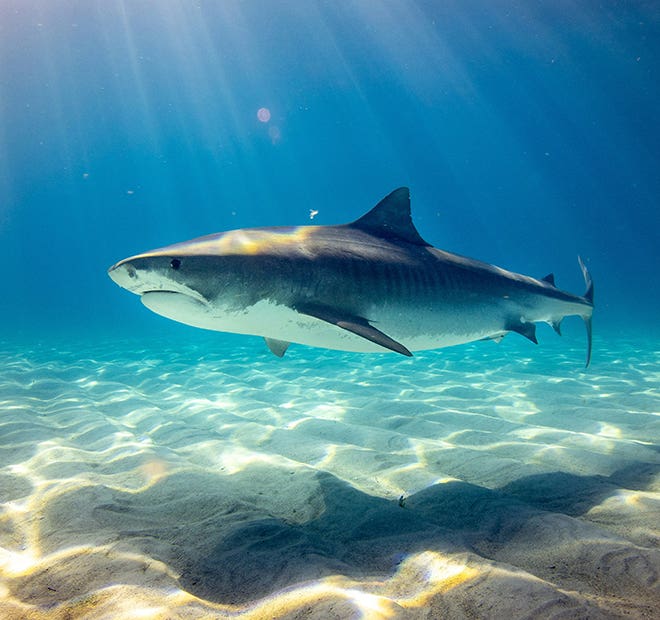Love them, hate them, admire them, or fear them, sharks have captured our imaginations for millennia.
What we do know: we need them.
As apex predators, sharks help keep the ocean’s various populations in check. What you may not know is that they also help maintain healthy coral reef and seagrass ecosystems, making them more resilient to the type of extreme climate events we’ve been experiencing more and more frequently.
We’re still learning about sharks. It’s been only in the past 15 years that 20% of all known shark species have been scientifically identified and described. Unfortunately, more than 30% of known shark species are threatened with extinction due to overfishing, habitat destruction, pollution, and climate change.
Re:wild is a proud partner of the Shark Conservation Fund (SCF), the world’s leading collaboration of philanthropists dedicated to restoring ocean health through shark and ray conservation. Re:wild also works on marine protected areas, island-ocean ecosystems, and exploration projects that identify and protect new species, including sharks.
Whether you’re landlocked or surfing daily, here are ways you can help protect sharks in the wild:
1. Shop shark-free. Check cosmetic products and vitamin labels for squalene-based shark oils and parts – you want to avoid those ingredients! Also avoid purchasing shark curios like jaws and teeth.
2. Change what you eat. Overfishing is the biggest threat to sharks and rays. In the oceans, marine animals are industrially hunted (a.k.a. ‘fishing’) including for use as feedstock in farmed animals (both livestock and other fish, such as salmon), which has decimated ecosystems. Consider removing meat, dairy, and fish altogether. Globally, we have inefficiently harvested domesticated and marine animals for food. Eating more plants is better for our health and for the planet. Learn more.
3. Upload your pics! Engage in citizen science projects – crowdsourcing for scientific data – related to marine life. Re:wild and partners recently announced the Search for Lost Sharks as part of our Search for Lost Species program. Check out the excellent citizen science app iNaturalist to get started.
4. Vote pro-shark. Advocate for and support laws and regulations that protect sharks and their habitats. This can include measures to ban unsustainable shark fishing, establish marine protected areas, and end the trade in threatened shark species.
5. Pass on the plastic. Minimize plastic waste, which can end up in the ocean and harm marine life. Reducing plastic use helps protect sharks and other marine creatures from ingestion and entanglement.
6. Dive in – carefully. If you’re diving or snorkeling in shark habitats, follow guidelines to minimize disturbance. Avoid touching or feeding sharks, respect their space, and make sure to use reef-safe sunscreen. Even more importantly, make sure you are equipped with appropriate in-water skills to minimize your impact on habitats and species.
7. Celebrate sharks! As a shark fan (or at least appreciator), you can celebrate them and their amazing contributions to nature by sharing information like this with your circles. Check your facts to ensure you aren't spreading false and sensationalist information. A great resource for reliable information on sharks and rays can be found here.
8. Donate. Contribute to or volunteer with organizations dedicated to shark conservation. Support Re:wild’s work with sharks here.



